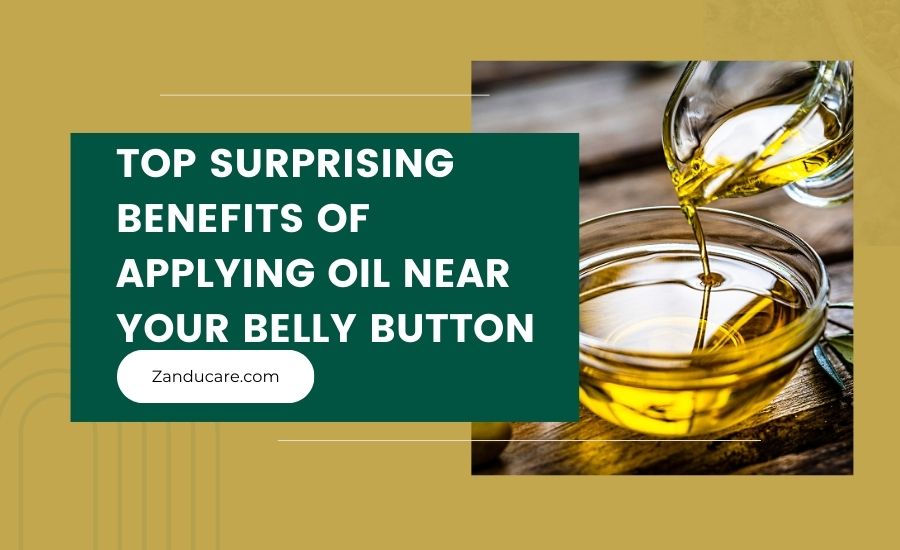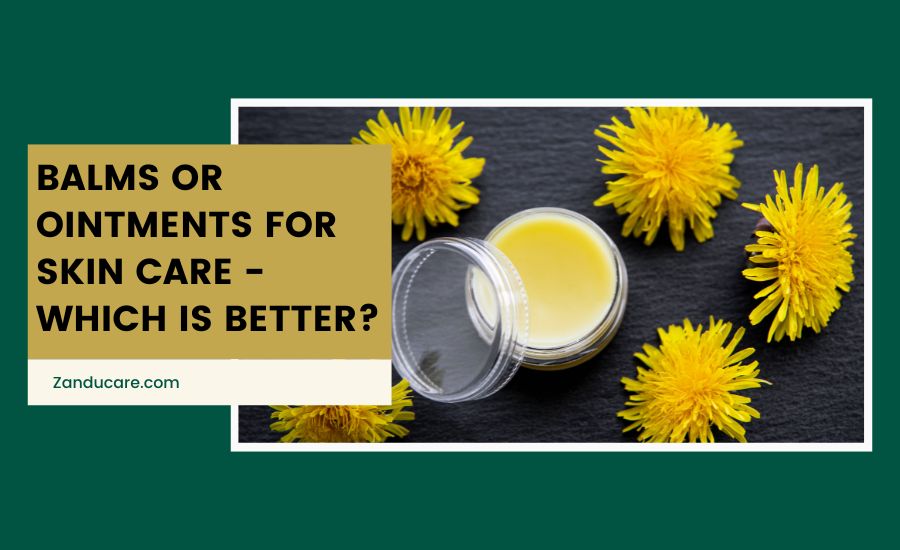
Top 10 Benefits of Applying Oil Near Your Belly Button
|
Key insights:
|
Applying oil to the belly button area is an ancient practice, especially in Ayurvedic medicine. It is thought to have health benefits by stimulating nerves and veins connected to different body parts.
The belly button is an important spot in the body where nutrients and oils can be absorbed. In Ayurveda, this spot is sometimes called the "Pechoti gland."
You may wonder if putting oil on your belly button region is helpful. In this article, we will look at the possible benefits of oiling this area. We will also explore why it may work and how it might improve physical and mental well-being.
|
Did You Know?
|
Science Behind Applying oil to the Belly Button

According to Ayurveda, the belly button is the hub for more than 72,000 nerves connecting to other bodily organs.
Applying oil to this region is thought to facilitate the absorption and distribution of the oil's nutrients throughout the body, influencing many systems, such as the respiratory, neurological, and digestive systems.
Several oils, including castor oil, mustard oil, and coconut oil, are said to provide some health advantages when applied to the navel.
Benefits of Applying oil to the Belly Button
Below are some of the advantages of applying oil to the belly button:
1. Improves Skin Health
The skin around the belly button is sensitive and can easily become dry. According to a study by the National Institute of Health, coconut oil contains fatty acids that deeply nourish and moisturise the skin, making it soft and smooth. Applying coconut oil to the belly button helps keep the area from getting dry and may lower the chances of skin irritation or infections.
2. Improves Digestion
Applying oil close to the belly button has several advantages, including that it helps facilitate digestion. The digestive tract can be stimulated by applying oils to the belly button, which is the body's centre. Applying castor, olive, or coconut oil can help ease constipation, lessen bloating, and improve digestion.
3. Promotes Healing
According to studies, coconut oil effectively treats minor wounds or infections because of its inherent antibacterial and antifungal qualities. By forming a barrier against bacteria, applying coconut oil to the belly button helps hasten healing and lowers the chance of infection.
4. Treats an Upset Stomach

Nausea, bloating, and stomachaches are typical signs of food poisoning, diarrhoea, and indigestion. Applying oils to the navel can relieve these symptoms. Use a carrier oil and essential oils like peppermint and ginger.
With these oils, you may forget about gastrointestinal problems. Peppermint oil in a coconut base works wonders for relieving constipation and bloating in the navel.
5. Relief from Menstrual Cramps
Women who experience menstrual cramps may get relief by putting oil close to their belly button. Particularly well-known for its anti-inflammatory qualities, castor oil can lessen the intensity of menstruation pain.
It is believed that applying heated oil during menstruation relaxes the muscles, releasing the tension that leads to cramps.
6. Improved Fertility
In certain cultures, placing oil on the belly button is said to increase fertility by stimulating the reproductive organs. Oils like castor or neem can also help the reproductive system be healthier.
Although there isn't enough scientific data to support this, many women have experienced benefits from regularly rubbing oil to their belly button, including better menstrual cycles and increased fertility.
7. Mental Well-Being and Stress Relief
The relaxing properties of some essential oils, such as sandalwood or lavender, are well-known. It is thought that using these oils close to the belly button can assist in calming the nervous system, which lowers tension and anxiety.
Additionally, the aromatherapy benefit of these oils' fragrances might help promote mental calm.
8. Stimulates Hair Growth
The belly button, which is connected to 72,000 veins throughout the body, aids in the body's absorption of minerals that promote healthy hair volume and growth. Premature greying of hair can be avoided by feeding the veins that cause it, strengthening the hair from the ground up.
Coconut oil, which is abundant in vitamins, minerals, copper, zinc, and vitamins C, B, and E, is the finest option for preventing hair loss and enhancing hair quality. One can also apply jojoba or olive oil to the belly button to avoid having too dry hair and scalp.
9. Improves dry Eyes Syndrome
Smoking, excessive reading, screen time, pollution, age, and other medical conditions can all cause dry eyes, which can impair vision and cause a burning feeling in the eyes. You may increase blood circulation and eye health by using coconut to massage your belly button and replenish the dry veins.
So don't hesitate any longer and give them a try to maximise the benefits of navel oil therapy.
10. Boosts Immunity

Essential oils that have been used to improve immunity include eucalyptus and lavender oils.
Applying these oils close to the belly button allows the body to absorb the nutrients and boost the immune system. These oils are also believed to help with sinus issues, coughing, and colds by promoting respiratory health.
Which Oils Should you use to oil the Belly Button?
Below are some of the oils which you can use to oil the belly button:
- Coconut Oil: Moisturises dry skin and protect it with its antibacterial properties, keeping the belly button area soft and irritation-free.
- Almond Oil: Rich in vitamins E and A, it nourishes the skin, reduces dryness, and can help improve skin tone around the belly button.
- Mustard Oil: It warms the skin and stimulates circulation, is ideal for colder months, and has natural antibacterial benefits to prevent infections.
- Olive Oil: Deeply hydrates and heals dry or irritated skin due to its antioxidant and anti-inflammatory properties.
- Neem Oil: Antibacterial and antifungal, neem oil helps protect against infections and nourishes sensitive skin around the belly button.
- Castor Oil: It is thick and hydrating, it detoxifies the skin, improves circulation, and has antimicrobial properties for added protection.
- Jojoba Oil: It resembles natural skin oils, is non-comedogenic, and is rich in vitamins that repair and hydrate skin without clogging pores.
- Ghee (Clarified Butter): Deeply moisturises, soothes irritation, and provides a natural glow, especially beneficial in winter.
- Sesame Oil: Rich in antioxidants and antibacterial properties, it hydrates and detoxifies, supporting healthy skin around the belly button.
- Peppermint Oil (Diluted): This oil refreshes and soothes with a cooling effect, aiding digestion and keeping the area clean; it must be diluted before use.
Also, do check our related guides:
Conclusion
Rubbing oil on the belly button is a long-standing Ayurvedic tradition. It offers many health perks, including better immunity, improved digestion, less stress, reduced anxiety, hair growth support, and benefits for the skin and eyes.
There are many oil varieties to pick from. Choosing top-notch quality oils and applying them correctly is vital to get the most advantages.
FAQs
1. What will happen if I apply coconut oil to my navel?
In Ayurveda, the belly button is regarded as an essential energy centre in the body. Applying coconut oil to the belly button is thought to have a relaxing impact on the psyche, lowering anxiety and stress while encouraging general relaxation.
2. Why castor oil in the belly button?
Castor oil applied to the navel stimulates digestive enzymes, promoting easier digestion and avoiding bloating and indigestion.
3. How often should I put oil on my belly button?
You should do this each night before you go to bed. According to traditional research, applying oil to your belly button and rubbing it helps to repair, rectify, and balance the body's nerve connections.
4. How much oil should I put in my navel?
Apply a few drops of the heated oil on the navel with gentle pressure. Massage the oil around the navel with your fingertips in a clockwise circular motion. The navel or the surrounding area can be directly sprayed with the oil.
References:
- The skin around the belly button is sensitive and can easily become dry. According to a study by the National Institute of Health, coconut oil contains fatty acids that deeply nourish and moisturise the skin, making it soft and smooth (https://pmc.ncbi.nlm.nih.gov)
- According to studies, coconut oil effectively treats minor wounds or infections because of its inherent antibacterial and antifungal qualities. (https://pubmed.ncbi.nlm.nih.gov)






Leave a comment
This site is protected by hCaptcha and the hCaptcha Privacy Policy and Terms of Service apply.